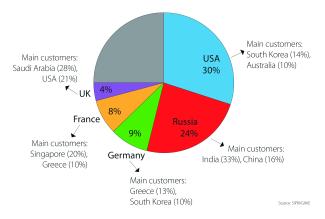Military
Problematic sale

Weapons are increasingly sold to crisis regions, according to a report that was published in late 2012 by Gemeinsame Konferenz Kirche und Entwicklung (GKKE), a joint initiative of the Catholic and Protestant Churches in Germany. It was written in cooperation with BICC (Bonn International Center for Conversion) and includes contributions by authors from research institutes as well as faith-based and other civil-society organisations. The report considers German exports of weapons of war and armaments in 2011, and assesses their relevance for peace and development. According to the data, arms exports from the European Union rose to € 37.5 billion in 2011. Some European defence contractors sold weapons also to dictatorial governments, the report says. From Germany, armaments worth € 5.4 billion were exported – approximately € 700 million more than in 2010.
The GKKE experts consider remarkable the steep increase of exports to countries where, according to the BICC, either the observance of human rights, the security situation or defence spending are excessive, including Saudi-Arabia, India and Iraq for instance. According to the GKKE, such exports amount to contempt of EU-directives. The authors miss “a differentiated practice of granting licences in line with the EU’s restrictive principles”. They also miss transparency, arguing that there is currently no “effective parliamentary control” of arms exports.
The Catholic organisation MISEREOR belongs to the GKKE. MISEREOR-Bishop Werner Thissen points to the negative correlation of arms exports and sustainable development: “We ask the German government for a clear commitment to a restrictive arms export policy.” The bishop stresses that the constitution of the Federal Republic of Germany obliges the government to a foreign policy marked by and geared to peaceful means.
At the same time, the GKKE document considers Germany’s role in international negotiations as positive, particularly in respect to the global Arms Trade Treaty (ATT). Talks on the issue were cancelled in 2012 for the time being, but the GKKE appreciates Germany’s continued commitment to achieving this goal.
Link: Arms export report 2012 of the GKKE (in German)
http://www3.gkke.org/fileadmin/files/downloads-allgemein/REB-2012-BPK-Fassung.pdf








